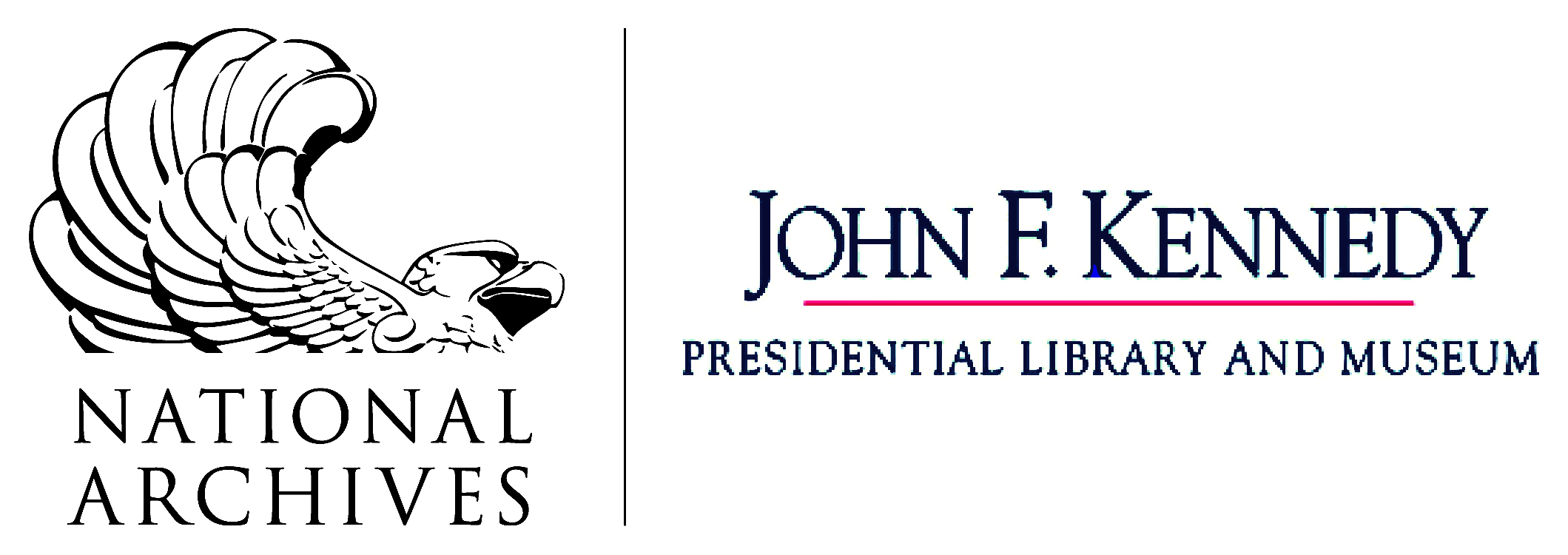By Stacey Flores Chandler, Reference Archivist
For the last several years, archivists at the John F. Kennedy Presidential Library have been digitizing documents created by or about communities that are often underrepresented in the historical record – and in history books. We’ve worked on archival collections related to discrimination against African diplomats in the United States; Black voter outreach in John F. Kennedy’s 1960 Presidential campaign; and racist policies impacting the United States military during Kennedy’s Presidency, and made them available for free online as part of the National Archives and Records Administration’s reparative digitization and description initiatives.* In addition to scanning the materials, we’ve added more descriptions and other information, including content notes and subject headings, to help make them easier for researchers to find and understand.
Since January 2024, we’ve digitized and cataloged another six collections and series, totaling nearly 15,000 pages of records. We’re excited to share some of this newly-available material with you!
*Content note: Many of these collections contain records that use now-outdated language to describe marginalized people and communities. The material is available in its original, unedited form to facilitate research of the historical record. Original descriptions, titles, and other language written by the creator(s) of the records have been retained in the finding aids, while archivist-created descriptions use language currently preferred by these communities wherever possible.
WINIFRED ARMSTRONG PERSONAL PAPERS
Winifred Armstrong was a recent college graduate when she embarked on a self-funded, two-year trip across the African continent. When she returned, she went to work as a consultant for Senator John F. Kennedy on issues related to African nations, advising him from 1959 until the start of Kennedy’s Presidency in 1961. Armstrong helped draft Senator Kennedy’s first speech on African affairs, and was a staff member on the United States Senate Foreign Relations Committee’s Subcommittee on African Affairs.
Her papers, along with her oral history interview, document her work on various issues in Senator Kennedy’s office, including: the racist discrimination that African diplomats faced when visiting the United States and trying to secure housing, local services, and schools for their children; her efforts related to a program commonly known as the “African student airlift,” during which hundreds of African students came to the United States for higher education; and matters related to the economy and security of various African countries.
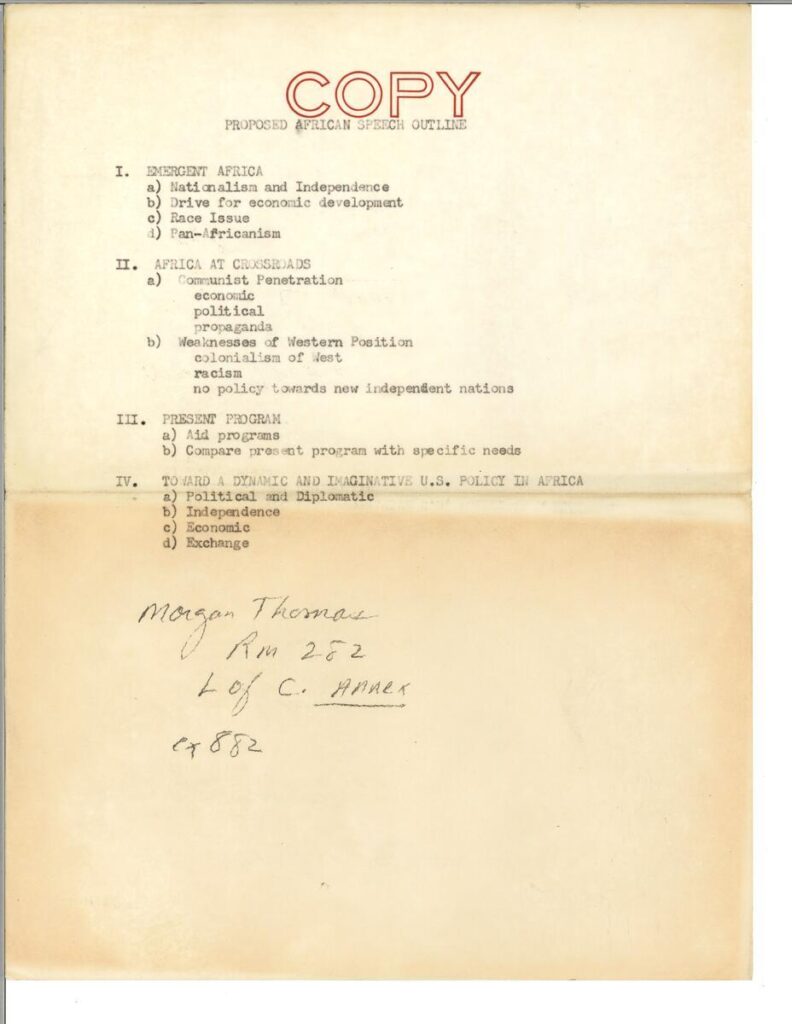
JOHN E. BARRIERE PERSONAL PAPERS
John E. Barriere, a World War II veteran from Worcester, Massachusetts, served as a staff member of the U.S. House Banking and Currency Committee from 1948-1965. In December 1960, he joined President-elect John F. Kennedy’s Task Force on Housing and Urban Affairs, formed to help Kennedy understand and develop policies for his new administration. Barriere’s papers document the Task Force’s research and proposals in a range of areas, including housing for older adults, farm workers, college students, and other people with low or no income; public transit; urban and suburban development; and the creation and management of a new, Cabinet-level federal agency for “housing and urban development.”
![President-elect John F. Kennedy's Task Force on Housing and Urban Affairs meeting, December 10 and 11, 1960
International Hotel, Idlewild Airport, New York
President: Dr Joseph P. McMurray, Chairman; Mr. Harry Held; Mr. Charles Wellman; Dr. Robert C. Wood; Mr. John Barriere; Miss Mary Lavery, Secretary
The portions of the Democratic Platform dealing with housing and urban affairs were discussed. The Chairman felt that the Committee should keep in mind the statement on need referred to in the Platform:
People living in substandard housing: 40,000,000
New families formed each year: 1,000,000
Existing homes lost through demolition or other causes each year: 300,000
Goal to be achieved - new homes to be built each ear: 2,000,000
It was agreed that the aim of this Task Force would be to propose the means of increasing the housing inventory, without specifically attempting the reach goal of two million homes per year.
Dr. McMurray read the letter from Mr. Sorensen outlining the responsibility of the Task Force.
At the outset of the meeting, Dr. McMurray outlined the conditions under which he undertook the independent study for the National Association of Home Builders, emphasizing the absolute and complete objectivity of the Study. He then explained the ideas contained in his preliminary report, copies of which were given to the Task Force members to read.
The members of the committee, after studying the report, agreed that it offered a new, imaginative, and practical approach to the problem of providing low and moderate priced sale and rental housing, and that it should be politically attractive, since it offered every group in the housing field a chance to participate. While it was believed that some of the vested interest groups might not like the competition, it was felt that they would [ends]](https://jfk.blogs.archives.gov/wp-content/uploads/sites/12/2024/05/JEBPP-001-005-P0001-800x1024.jpg)
ELIZABETH BOGGS PERSONAL PAPERS
Elizabeth Monroe Boggs earned her PhD in Theoretical Chemistry from Cambridge University in 1939, and quickly established herself as an accomplished researcher in the field of explosive lenses. But over the next few years, inspired by her son who lived with developmental disabilities (then referred to as “mental retardation”), Boggs pivoted her career toward public advocacy for people with intellectual and developmental disabilities. She co-founded the National Association of Retarded Children – now known as The Arc of the United States – in 1950.
Throughout her career, Boggs held a number of positions in federal and state government related to this work. In 1961, she was appointed to the President’s Panel on Mental Retardation, tasked with providing recommendations to the President on research, healthcare, education, employment, and legal protections for people with intellectual and developmental disabilities. Her personal papers collection (including her speeches, memoranda, and research papers) and two oral history interviews document her role on this Panel.
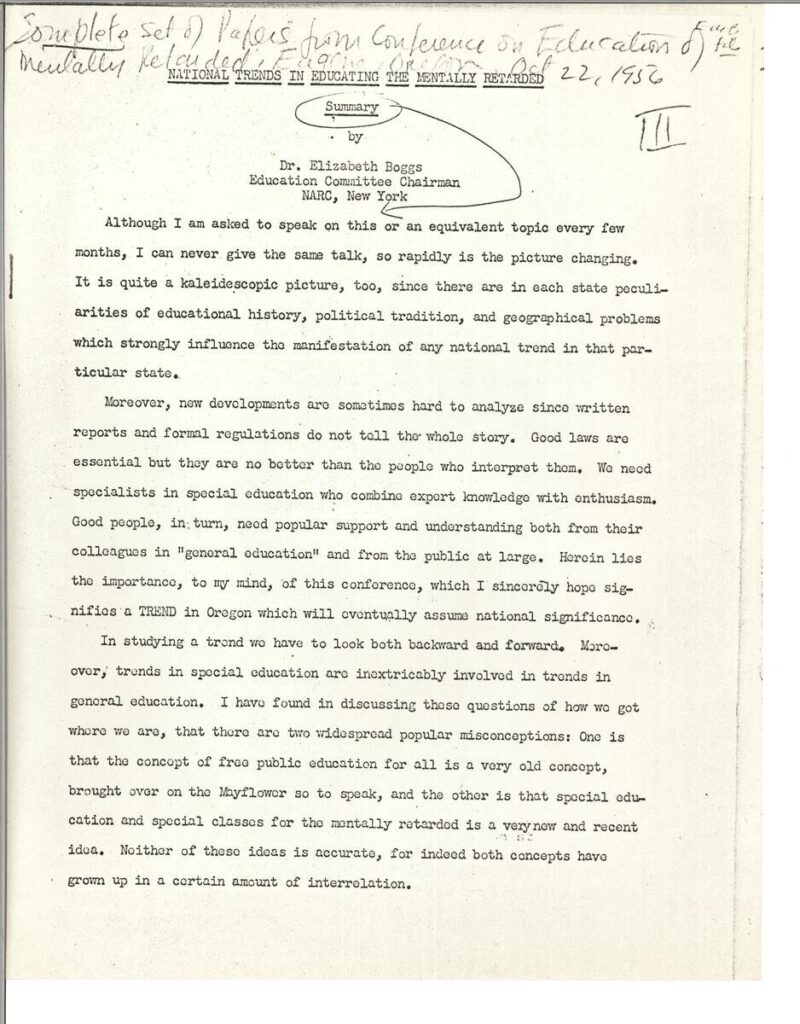
HIRSH FREED PERSONAL PAPERS
Hirsh Freed was born in Fitchburg, Massachusetts; after law school, he worked for the city of Boston and the Commonwealth of Massachusetts. In 1948, he co-founded the Boston law firm of Rome, Brown, Rudnick & Freed with three fellow Jewish attorneys who had experienced anti-Semitic discrimination barring them from partnerships at established firms. Freed also became active in local politics in the 1940s, serving as John F. Kennedy’s advisor on issues related to the Jewish community during Kennedy’s campaigns for and service as U.S. Representative for Massachusetts’s 11th District, and U.S. Senator for Massachusetts. He recalled much of this work in his 1964 oral history interview with the JFK Library.
Freed’s papers consists largely of his correspondence with John F. Kennedy and his staff, advising Kennedy on outreach to Jewish communities and commenting on United States policy toward Israel and Palestine in the 1940s and 1950s.
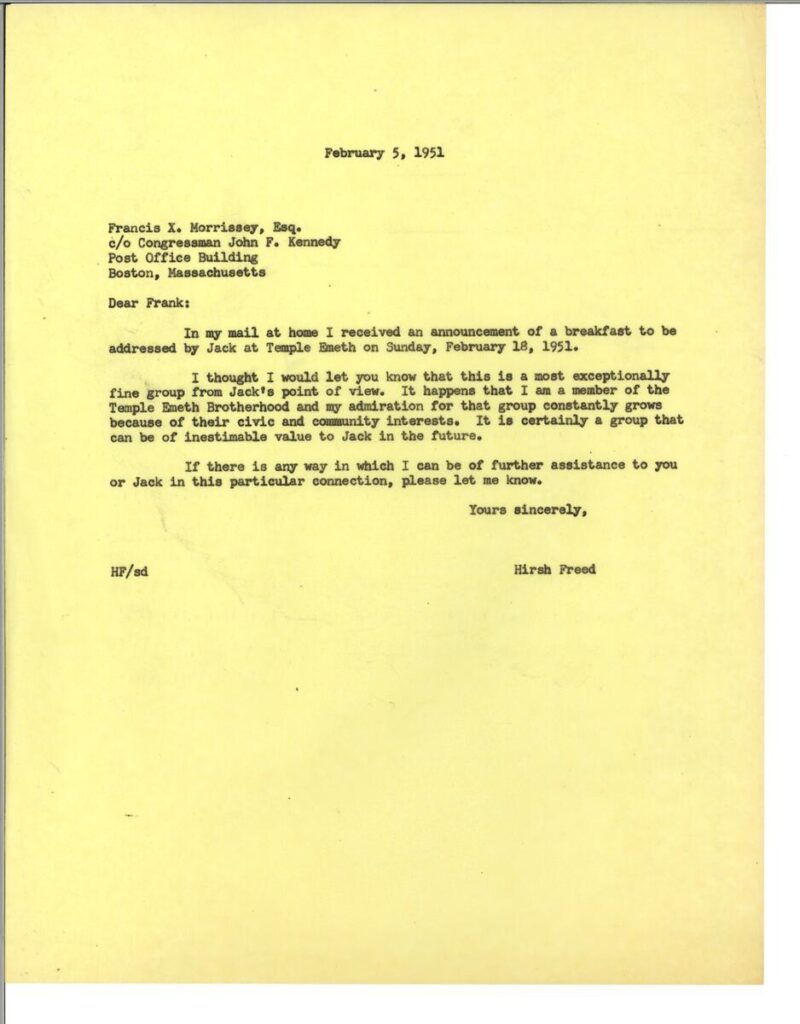
WARREN CIKINS PERSONAL PAPERS: CIVIL RIGHTS-RELATED SERIES
Born and raised in Boston, Warren Cikins moved to Washington in 1956 to begin a long career in civil and public service. He joined the John F. Kennedy administration in 1962 when the Congressman he worked for, Brooks Hays, was named a Special Assistant to the President. Much of Cikins’s work in the White House related to civil rights, and after Kennedy was assassinated, Cikins began serving as Special Assistant to the Staff Director of the United States Commission on Civil Rights; in this role, he helped to promote the adoption and implementation of the landmark Civil Rights Act of 1964.
In the Cikins papers, Series 4.5: “U.S. Commission on Civil Rights” documents his work managing the Commission, working with other organizations, and giving speeches. Of particular note are the activities reports and meeting minutes, providing a detailed view of the issues the Commission worked on during this important era in the Civil Rights Movement.
Cikins also served as Director of Legislative Affairs for the Equal Employment Opportunity Commission from 1967 to 1969. Series 4.7: “U.S. Equal Employment Opportunity Commission” documents his work in this capacity, with most records focusing on fair employment practices for women and people of color.
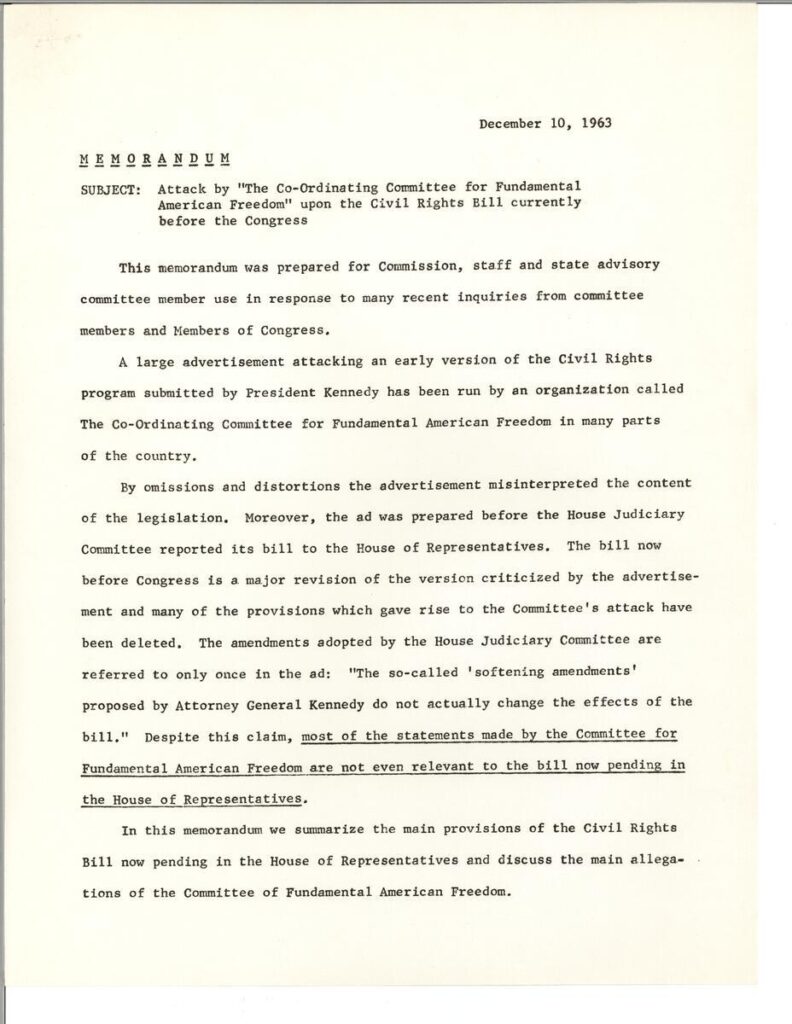
JOHN G. FEILD PERSONAL PAPERS
After returning from World War II to his hometown of Detroit, Michigan, John G. Feild worked as a secretary for the American Veterans Committee and served on the Mayor’s Interracial Committee, working to pass city and state anti-discrimination laws. He soon went to work as the first director of the Michigan Fair Employment Practices Commission, and in 1960, helped with Senator John F. Kennedy’s Presidential campaign.
After Kennedy’s election, Feild was appointed Executive Director of the President’s Committee on Equal Employment Opportunity, charged with investigating racist discrimination against Black federal employees and contractors, and enforcing requirements for employers to take “affirmative action” to ensure fair labor practices. Field held this role from 1961 to 1963, and discussed his work at length in his two oral history interviews. His papers hold correspondence, case files, and meeting minutes from his work on the Commission.
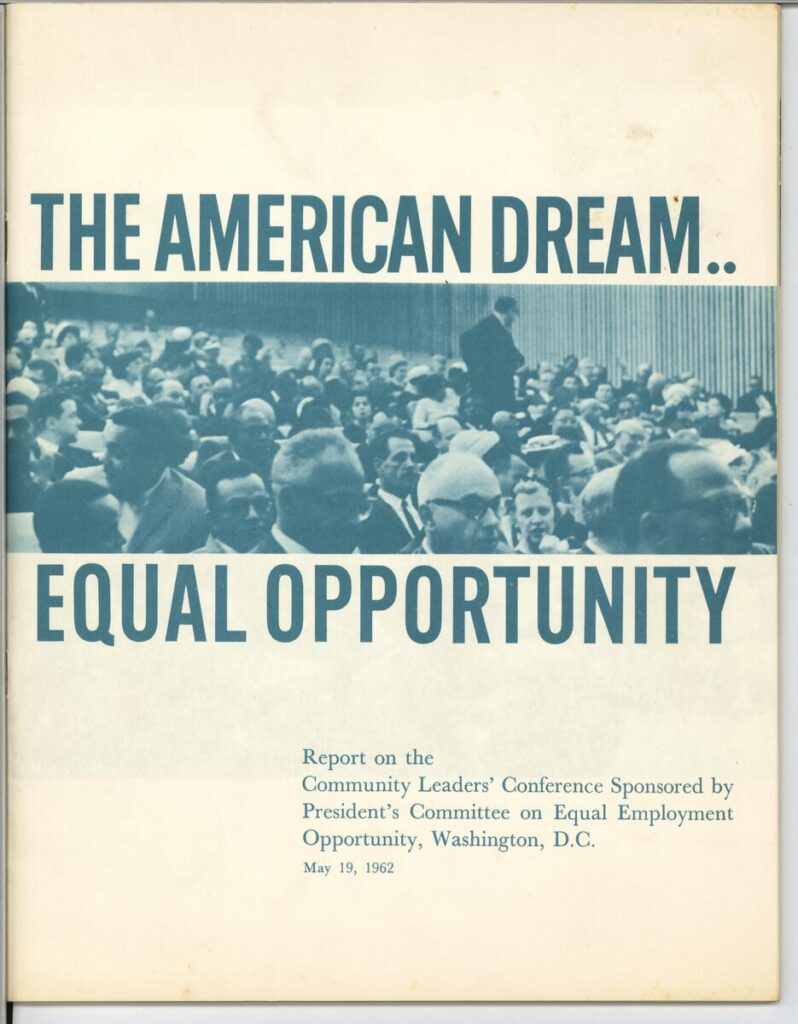
We’re continuing to work on digitizing collections related to communities that are often underrepresented in the historical record, with more material from the Berl I. Bernhard Personal Papers coming online in the next few months. If you have any questions about our digitized holdings – or if you want to know how you can request digitization of materials in the JFK Library’s archives – reach out to us at Kennedy.Library@nara.gov!
